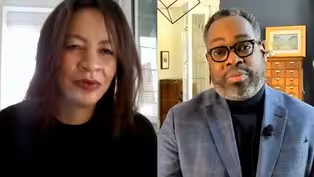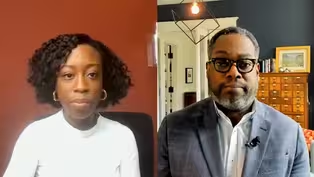
Detroit’s Black political representation: Past and present
Clip: Season 51 Episode 8 | 6m 19sVideo has Closed Captions
Examining the history of Detroit’s Black political representation in Congress.
BridgeDetroit Engagement Director Orlando Bailey sat down with longtime Detroit political consultant Adolph Mongo to talk about the city’s Black political representation over the years, how it has changed and why. Plus, they discuss the role that Michigan’s new redistricting maps had on the 2022 election cycle and Black voter turnout in Detroit.
Problems playing video? | Closed Captioning Feedback
Problems playing video? | Closed Captioning Feedback
American Black Journal is a local public television program presented by Detroit PBS

Detroit’s Black political representation: Past and present
Clip: Season 51 Episode 8 | 6m 19sVideo has Closed Captions
BridgeDetroit Engagement Director Orlando Bailey sat down with longtime Detroit political consultant Adolph Mongo to talk about the city’s Black political representation over the years, how it has changed and why. Plus, they discuss the role that Michigan’s new redistricting maps had on the 2022 election cycle and Black voter turnout in Detroit.
Problems playing video? | Closed Captioning Feedback
How to Watch American Black Journal
American Black Journal is available to stream on pbs.org and the free PBS App, available on iPhone, Apple TV, Android TV, Android smartphones, Amazon Fire TV, Amazon Fire Tablet, Roku, Samsung Smart TV, and Vizio.
Providing Support for PBS.org
Learn Moreabout PBS online sponsorship- Adolph, so the conversation about Black representation has been palpable lately with the election of congressman Shri Thanedar in the election a few years ago of congresswoman Rashida Tlaib, but at one point Detroit was a strong hold for Black political power.
How did we get there, and how did we get to where we are now?
- Easy, people didn't vote.
And people don't vote.
And the so-called elitists who are supposed to represent this majority Black population sold out.
Basically, how can you let somebody like Tlaib come into Detroit?
Didn't live in Detroit, lived in Dearborn.
But it wasn't Tlaib, we go back to Steve Tabackman who was a state rep in Southwest Detroit moved from Huntington Woods to Southwest Detroit, and then you had five or six candidates running in that state rep seat which was a seat held by a person of color.
Whether it was Brown or Black, they ran and Tabackman come in well financed, he won.
He's representing a majority of a district of color.
After him, it was Stephanie Chang.
It was Rashida Tlaib.
Listen, it's like they just brought in all these folks and said, "Okay, we gonna represent that area."
So it started there, really.
Detroit has always been fair when it came to electing folks, that when it become a majority Black city, we still elected non people of color.
Mayo Rabbit, Maryann Mahaffey, Jack Kelley, I can name them.
Those people cared about Detroit, but nah, we got people that buy seats.
Shri Thanedar came, he ran for governor and then he went and bought a house in a part of a district and guess what, he bought the state rep seat.
A year later, he's running for congress with eight, nine people in the race.
Tlaib, same way.
Brenda Jones had a great opportunity to win that seat right there, but she decided she want to be in both races when Jon Conyers passed away, oh, I'm gonna run in the special election.
Oh, she won the special election, became a congresswoman, what, for two weeks?
Okay.
- You talked about people not voting, coming out to vote.
Why aren't Black people voting in the city of Detroit?
- People period not voting.
But especially Black people, young folks.
Last candidate we had, it wasn't really an election, it was a movement.
It was Barack Obama.
People came out and voted that hadn't voted, never voted 'cause they wanted to make history.
And he had a lot to say.
- Is that all?
Is it just that they wanted to make history or he-- - Both, both.
He had a lot to say.
People was looking for something different.
He brought them hope.
We don't have candidates like that.
Now, redistricting really diluted Black representation.
The democrats threw Detroit under the bus.
We are in these districts where people from Birmingham and Madison Heights and Warren, they represent Detroit now.
- Do you believe that he last congressional election was a referendum on how redistricting went?
Democrats really wanted to draw districts that were going to favor democrats, but not necessarily favor Black democrats or Black Detroiters.
- There's no question about it that you put a little pocket of Detroit in there, it makes a difference, but not enough difference to elect somebody.
Say like Marshall Bullock was a state senator, boom, eh.
Young lady out in Birmingham that represent Birmingham, Royal Oak and Huntington Woods et cetera.
That's her base.
And she won, she killed them.
Raised all the money in DC, and he didn't even have a chance.
- I hear stories about Comey Young and what his election meant to Black Detroiters in 1973, and they kept him elected all the way until the early 1990s.
Really modeling for the country Black political stronghold.
Talk about that time and what it meant for Black Detroiters to feel really represented.
- Before then, you didn't have too many Black officials.
You had people getting elected.
- Like John Conyers was elected.
- John Conyers, Charlie Dix, Barbarose, Collins, the statehouse, you had many women, Black women particularly that was elected.
That was a heyday though.
Morris Hood, his brother.
Detroit had to fight, at that time, Colmean Young had to fight the police department.
Had to fight the fire department because of, they refuse forever to hire people of color.
They have a few.
During the race riots of 1943, there was 35, 36 African American police officers and they took their guns from them.
And they disarmed them.
And then in '67, who knows.
It was less than 200, and maybe less than 100 that was on the police department.
He got elected, and he worked 20 years in the courts to make the police department the way the community was made up.
After 70 years, Detroit lacks Black Congress member
Video has Closed Captions
Clip: S51 Ep8 | 9m 25s | For the first time in nearly 70 years, Detroit lacks Black representation in Congress. (9m 25s)
Healing from the mass shooting at Michigan State University
Video has Closed Captions
Clip: S51 Ep8 | 5m 54s | How does Michigan State University start to heal after the Feb. 13 mass shooting? (5m 54s)
Providing Support for PBS.org
Learn Moreabout PBS online sponsorship
- News and Public Affairs

Top journalists deliver compelling original analysis of the hour's headlines.

- News and Public Affairs

FRONTLINE is investigative journalism that questions, explains and changes our world.












Support for PBS provided by:
American Black Journal is a local public television program presented by Detroit PBS

